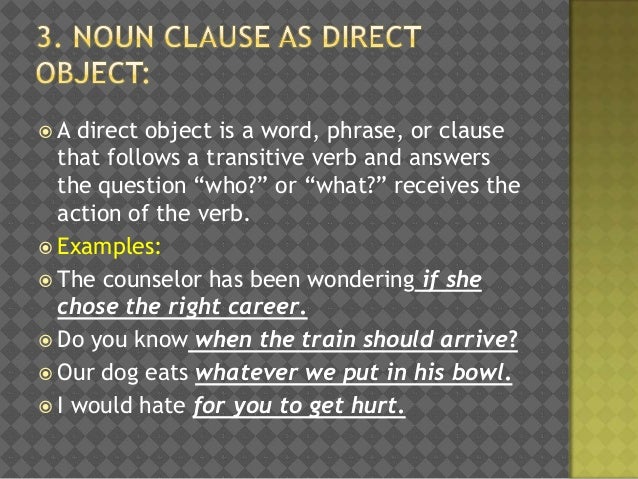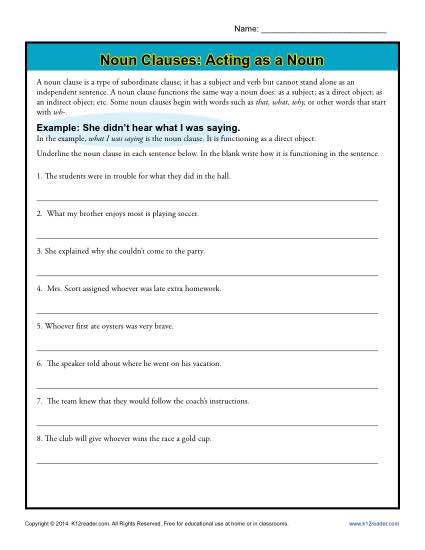Example Of Noun Clause | The question is how to finish on time. We welcome your feedback, comments and. I didn't know that he was coming to the party. A noun clause is that contains a finite verb and functioning like a noun within a sentences. A clause is a group of words containing a subject and a verb. The examples below show how they are used noun clauses often use words such as when, what, why, who and other question words, but the speaker may or may not be making a question. For example (noun clauses shaded) here are some examples of noun clauses: Noun clauses describe something about the verb or the sentence. A noun clause is a dependent clause that contains a subject and a verb. The noun clause is a clause that functions like a noun in the sentence. Examples and definition of a noun clause. Dependent clauses can function either as noun clauses, adjective clauses, or adverb clauses. I include many example sentences. Do you know what the weather will be? A noun clause can be the subject or object of the verb in the main clause. In this example, the noun clause is the object of the sentence. This includes main clause examples with clauses and phrases exercises and worksheet. Just like nouns do, a noun clause names people for example, the village where i live is a good place for farming. I didn't know that he was coming to the party. Noun clauses consist of a clause preceded by a subordinating conjunction. Noun clauses are subordinate or dependent clauses that are formed by a subordinating conjunction followed by a clause. I don't know if my brother is at home. What you think does not matter. It is important to think about why she behaved like that. A noun clause can be the subject or object of the verb in the main clause. In the example the great thing about my kids is they all get along, that for example, if the sentence asks do you know what time we are leaving? the noun clause is what time we are leaving? you can't easily substitute. A person who trusts no one can't be trusted. In each example, the noun clause is shaded, the subject of the clause is bold, and the verb of the noun clause is underlined. Buy gifts to whomever you want. In the example the great thing about my kids is they all get along, that for example, if the sentence asks do you know what time we are leaving? the noun clause is what time we are leaving? you can't easily substitute. Adjective complements often provide a reason why someone or something is a certain way. Another example is given below. In this article, we are focusing our attention on noun clause. We use who, what, which, whose, whoever, whatever, when, where, why, whether, how and that in noun clauses. A noun clause functions as a noun, which means it can be a subject, direct object, indirect object, object of a preposition, predicate nominative, or appositive. It might be a noun clause. Noun clauses consist of a clause preceded by a subordinating conjunction. A noun clause is a dependent clause that acts as a noun. A noun clause is that contains a finite verb and functioning like a noun within a sentences. A noun clause is a clause (containing a subject and a verb) that can replace a noun. How you solved this complex math problem astounded your classmates. They are noun clauses, adjective clauses, and adverbial clauses. We use who, what, which, whose, whoever, whatever, when, where, why, whether, how and that in noun clauses. Noun clause with if or whether. She believed that i was right. Need help understanding is a noun clause and what isn't? A clause is a group of words containing a subject and a verb. The noun clause is a clause that functions like a noun in the sentence. Looking at the example sentence diagrams below will make it easier! A noun clause is that contains a finite verb and functioning like a noun within a sentences. It is important to think about why she behaved like that. Noun clauses perform many of the same functions as nouns and noun phrases. The professor based his lesson on how we should analyze sentence structure. Like all clauses, a noun clause contains a subject (sometimes represented by one of the words above) and a predicate (a verb and any additional information attached to it). Do you know what the weather will be? What she did was to let out a scream. In this article, we are focusing our attention on noun clause. The two forms of noun clauses in the english language are finite noun clauses and nonfinite noun clauses. The introductory word generally has a grammatical function in the.


Example Of Noun Clause: Noun clauses are clauses that function as nouns.


0 komentar:
Posting Komentar